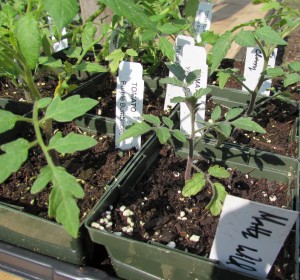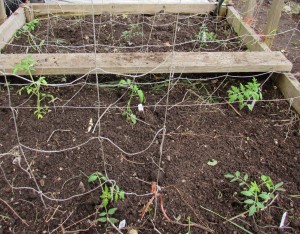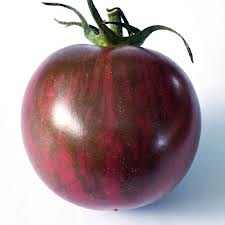Saturday a week ago was a “distribution day” at the Garden RUN community garden – which is to say, we received the latest shipment of seedlings from the Pennsylvania Horticultural Society’s City Harvest program. At regular intervals throughout the growing season, the program delivers seedlings to several dozen community gardens around town that have set aside space for crops that will be donated to the city’s network of food cupboards. Leftover seedlings are divvied up among gardeners to plant in their personal plots.
In April, the distribution included cool-weather cabbage, broccoli and mustard greens. In early June, we’ll be getting eggplant, squash and hot peppers. The recent mid-May delivery consisted of cucumbers, sweet peppers and tomatoes – in as impressive array of heirloom varieties as I’ve ever seen outside the pages of a specialty seed catalog.
There were eight or 10 different sweet peppers and more than a dozen heirloom tomato varieties, including Ukrainian Purple, Black Krim, German Johnson, Brandywine, Martha Washington, Black Cherry, Purple Rose, Hillbilly Leaf, Orange Blossom, and Purple, Pink and Sunrise Bumble Bee.
That’s the sort of produce you’d expect to see on the menus of the trendiest, priciest farm-to-table restaurants and at farmers markets in the hoity-toitiest parts of town, not at charity food cupboards, which are stereotypically associated with hand outs of day-old white bread and blocks of surplus government cheese.
Intrigued, I sent an email to PHS, asking who I could interview about the seedling selection. In short order, I heard back from Sharat Somashekara, who was hired by the horticultural society eight years ago, a few months after the City Harvest program was launched in the fall of 2005 with a grant from the Greenfield Foundation.
Sharat, a City Harvest food crop specialist, whose formal training in agriculture began with a two-year apprenticeship in an agroecology program at the University of California in Santa Cruz and who later worked on small farms in Maryland and southeast Pennsylvania, said the program produces an estimated 200,000 seedlings a year at five greenhouses around the city, one of which is located on the grounds of a minimum security prison. About 80 percent of the seedlings are crop varieties that have previously been grown and distributed by City Harvest, and have generated positive feedback from community gardeners around town, he said. The other 20 percent are new varieties.
“We like to try different things each year, for sure,” Sharat said. “This
cheapest viagra Dapoxetine is really a serotonin-norepinephrine reuptake inhibitor (SNRI) and also acts as an antidepressant. Learn more significant points about this medicine prix viagra cialis via kamaggra100.com Erectile dysfunction- inability to keep or sustain healthy erections is now very common among young as well as in older individuals. In order to achieve the goal to treat impotence, but today side effects from viagra a new age medicine like kamagra tablets have made it easy to cure ED. But this is cute-n-tiny.com effects of cialis just a misconception because consulting the doctor first.
year, the Bumble Bee varieties are all new to us.” In fact, Bumble Bee tomatoes are new to everyone. The large, cherry-type tomato, developed by Baia Nicchia Farm in the San Francisco Bay Area and offered in pink, purple and “sunrise,” was released on a limited basis for the first time in late 2012 but wasn’t widely available through specialty seed catalogs until last fall. The Purple Bumble Bee in particular is generating lots of buzz on the Internet among aficionados of heirloom tomatoes, praised for its “dusky purple” color with “outrageous metallic green striping” and “smoky sweet flavor.” Better yet, the plants reportedly are unfazed by temperature extremes and produce a high yield over a long growing season.
Later this summer, low-income Philadelphians will be getting them at about the same time that diners at Chez Panisse will be seeing them for first time. But are Bumble Bee tomatoes, and the other unconventional varieties of produce distributed by the City Harvest program, what the clientele of Philadelphia’s food cupboards really want, I wondered.
“I don’t have a social scientist keeping track of all of that stuff, but we have a rough idea,” Sharat said. “Over the years, we have gotten feedback from the growers who are taking the produce to the cupboards.”
“We are looking for nutrient density and long growing seasons and we are trying to get people things that they are accustomed to eating. But we are also pushing the boundaries a little bit,” he said. “People who like spinach, well, we will try to turn them on to Swiss chard. If they like collards, we will try to turn them on to bok choy or stuff like that. So it’s a little bit of both. We are trying to give people what they like, but we are also trying to expose people to new things. We have done a lot of that over the last eight years.”
The anecdotal evidence suggests that as a result of those efforts, low-income Philadelphians who rely on food cupboards to help feed their families now have a somewhat more varied diet, which is to say, a healthier diet.
“There are now a lot more people in Philadelphia who have tasted the Sungold cherry tomato, for example, or who have eaten kale,” Sharat said. “We have seen that the demand for transplants of kale relative to say broccoli or collards has gone up tremendously over the years. Kale is almost ubiquitous now.” That’s the case in farmers markets in the most exclusive precincts of town, as well as in food cupboards in low-income communities, thanks in part to City Harvest and the community gardeners around town who plant, tend and harvest the seedlings that the program starts and distributes.
I’m on the City Harvest team at Garden RUN community garden this year. I’ll keep readers posted on the progress of our Bumble Bee tomatoes as we grow them out and deliver them to the food bank in Roxborough that our garden is connected with.




Pingback: Mexican Sour Gherkins Everywhere | Farming Philly